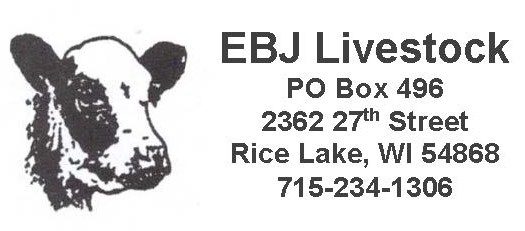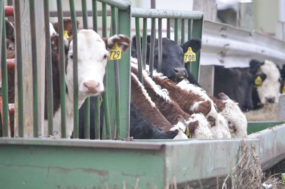“We know we have to keep cattle moving, and we have to keep beef moving to the consumer,” Woodall said of the efforts to strengthen the supply chain. Noting the similarities to last summer’s closure of a Tyson plant after a fire, Woodall said this crisis will require steady work with the packing industry.
“We can’t afford for a packing plant, or plants, to go down or slow down, because that’s going to make the market situation we’re in even worse.”
Woodall also noted that the supply chain must remain strong as a viable and reassuring supplier to a public that is in a panic. “We need to send a very clear message that there is not a beef shortage.”
The video was released Monday, one day after President Trump moved back his guidelines for a potential opening for reduced social distancing. Following recommendations of his COVID-19 Task Force, Trump said social distance guidelines under the CDC would continue through April 30. Woodall’s closing comments offered a warning that tougher days may come ahead.
“As we look at this virus, and its continual outbreak in rural America, I’m afraid it’s going to get worse before it gets better for us,” Woodall said. “NCBA will continue to be here every single day. Working with all segments of this industry, to ensure that our response is one that helps us get through it.”
Woodall praised the “unbelievable demand for our product in our retail outlets.”
“In times of crisis, individual Americans want a little comfort and they want a little security. When it comes to comfort and security, they want beef to provide that.”
Packer and agency assurances
NCBA worked with the four largest beef packing firms to get assurances they will have steady labor, including contingency plans should workers get hit by sickness.
Woodall also said the government agencies working with packing houses also discussed continued work from USDA graders, and Food Safety Inspection Service inspectors, as well as input from the U.S. Centers for Disease Control and Food and Drug Administration, to make sure the food security roles are maintained and continue through the crisis.
Transportation exemptions
Woodall summarized efforts to have the U.S. Department of Transportation grant waivers on trucking hours of service, “to keep truck drivers on the road longer in order to get those cattle to market and to get that beef into retail shelves.” After those waivers were approved, Woodall said NCBA asked for higher weight allowances on trucks. Language in the congressional stimulus package was included allowing governors to enhance effort to get weights on trucks increased.
Truckers were also included as part of the “critical infrastructure” Woodall noted, so as to keep locations open on highways for truckers to eat and rest for long hauls.
“We’re very proud of the commitment from cattle haulers, producer haulers across the country in working the log hours they need to keep the shelves full.”
NCBA also sought assurance from Department of Homeland Security to keep “all facets of beef supply to be deemed essential” and providing documentation for producers and their workers to be on the roads and in the open during state shelter-in-place shutdown.
Other regulatory changes
Woodall said environmental inspections pose obstacles for the nation’s production chain, both as a COVID-19 transmission risk, and a delay for cattle into the supply chain. NCBA asked EPA to remove those inspection obstacles. “They have complied with temporary order making inspections discretionary,” Woodall said. “We’re hopeful that even in this crisis the EPA has done its part to help us so we can put beef on the table.”
Other agencies including the USDA and Labor Department are helping on guest worker programs, Woodall said. “We have to make sure the workers on farms, ranches, feedlots and packing plants, can stay in this country. We’ve been able to achieve that as well.”
Congress and CARES Act
The congressional aid bill passed March 27 has several items outlined by Woodall that provide assistance to ranchers and producers.
USDA’s Farm Service Agency can more flexibility on loan applications and execution of loans. ore flex on loan apps and the execution of loans.
Woodall outlined additional flexibility in the package for tax relief, and provisions helping with net operating losses, interest deductions, and “biggest win” of money through earmarks for the cattle industry.
Woodall said that effort may stir controversy from conservative-minded budget hawks within the ag community.
“We have seen some significant market impacts through this. The grass roots members of this association and the leadership of our state affiliates got together and made the decision we needed to go in and also ask to be a part of this very important program.
“USDA is working to craft that program, and we are working with them to find the best way to assure that there is equitable distribution of these funds across all segments of the producer community – not the packers, the producers. We have made it very clear to USDA that we want them to work quickly to get these payments out.”
Market swings
Woodall noted market volatility as a major stressor for cattle producers across the country.
“There’s not a lot of explanation that makes sense right now. The panic of this pandemic has sent those markets crashing. Commodity markets went down, when fundamentals were telling us differently.”
But Woodall said NCBA has asked that no changes be made to CME live and or feeder cattle contracts, “which would make this situation even worse than it currently is.”
NCBA also has reached out to all commissioners on the Commodity Futures Trading Commission “to make sure they’re doing their job on oversight.”
Packing sector
Woodall said he’s made repeated calls and sent letters to the top packers, laying out firm expectations they be active in the market “and aggressive in their bidding.”
One week ago, Tyson Foods followed up on announced plans for assistance payments to cattle feeders that would add $5 per hundredweight (cwt) to live cattle and $7.94 per cwt to dressed and grid cattle.
“I know many of you watching this don’t believe the packers have done nearly enough, but I think if you look back at what we saw in the markets this week, it’s very clear they listened to us.”
Woodall said the plans will be pushed further. “We will follow up to see money they get from boxed beef will eventually get down to the producers. We need them to keep operating, but they also need us to keep operating.”
“Now is not the time for a packer war, now is the time to make sure that we are getting cattle processed, getting beef into the consumers’ hands. … We are trying to get through this crisis without a packing plant going down. And that is why we continue to work with these packers, all the while asking them to continue their efforts to provide a little support to the producer community.” ![]()

-
David Cooper
- Managing Editor
- Progressive Cattle
- Email David Cooper







